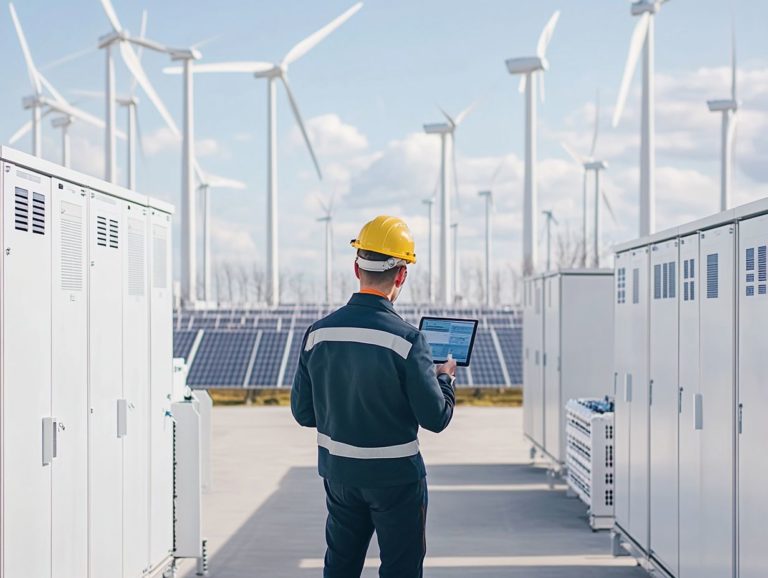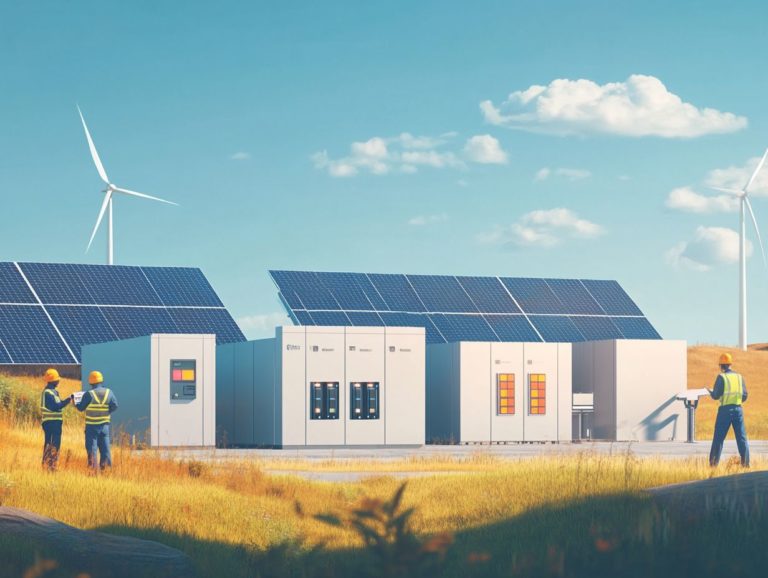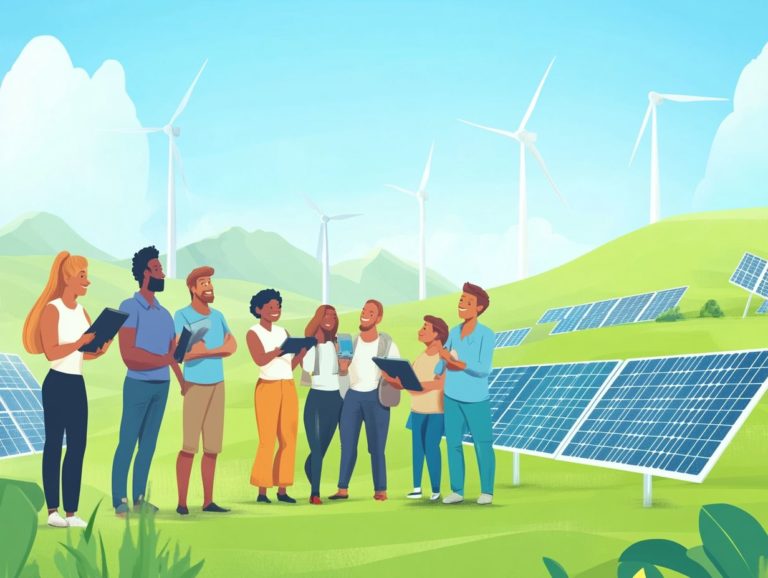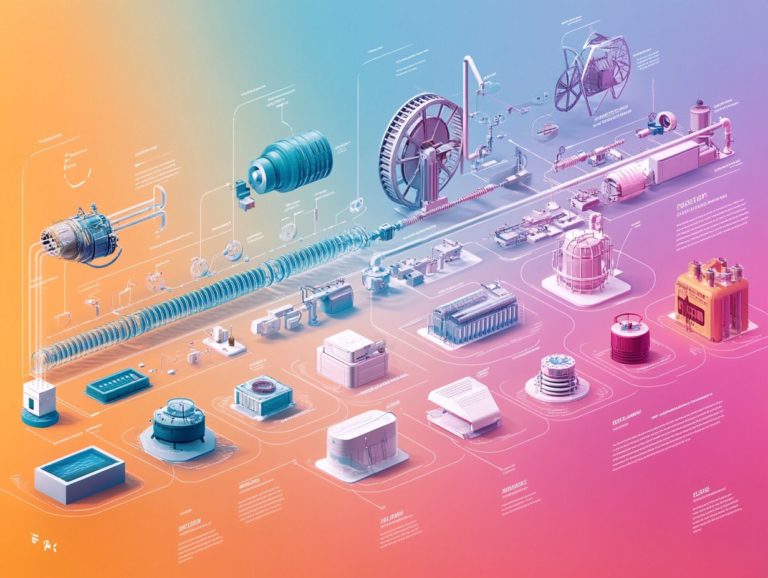The Future of Battery Technology: What to Expect
Battery technology, including lithium-ion and solid-state batteries, is at the forefront of innovation. This technology is intricately woven into the fabric of daily life and shapes a multitude of industries.
From fueling electric vehicles to enabling renewable energy solutions, advancements in battery design and materials are critical for a sustainable future. However, this vibrant field faces challenges, including environmental concerns and the complexities of battery recycling and production processes that require careful resolution.
Explore the current landscape of battery technology, uncover emerging innovations, and discover predictions for the future, including insights from leading companies like Quantumscape and CATL. These advancements are set to transform our world.
Contents
- Key Takeaways:
- The Importance of Battery Technology
- Current State of Battery Technology
- Understanding New Battery Technologies
- Potential Applications of Future Batteries
- Challenges and Obstacles
- Environmental Concerns and Cost Efficiency
- Predictions for the Future of Battery Technology
- Expert Opinions and Forecasts
- Frequently Asked Questions
- What is the current state of battery technology and where is it headed?
- What are some potential advancements we can expect in battery technology in the near future?
- Will the cost of battery technology decrease in the future?
- How will battery technology impact the renewable energy sector?
- Are there any environmental concerns associated with battery technology?
- What impact will battery technology have on transportation?
Key Takeaways:

- Innovations in battery technology, such as solid-state and lithium-ion batteries, are essential for the advancement of electric vehicles, renewable energy, and other technologies impacting our daily lives.
- While current battery technology has limitations, new materials and designs are being developed to improve efficiency, reduce costs, and mitigate environmental impacts.
- Experts predict that future advancements in battery technology will open up new applications, like energy storage for grids. However, challenges such as environmental concerns and cost-effectiveness must still be addressed.
The Importance of Battery Technology
Battery technology significantly influences modern lifestyles, affecting everything from electric vehicles (EVs) to renewable energy solutions. As the demand for efficient energy storage rises, advancements in technologies like lithium-ion and solid-state batteries become essential.
These innovations not only enhance the performance of electric vehicles but also pave the way for a more sustainable future. By lessening the environmental impact of energy consumption, they support climate legislation aimed at reducing carbon emissions, allowing everyone to contribute to a greener planet.
Impact on Everyday Life
The effects of battery technology on daily life are profound, especially regarding electric vehicles and the critical role of battery recycling.
As we embrace the shift towards electric vehicles, the convenience and efficiency offered by advanced battery materials become increasingly important. Innovations in battery technology provide longer ranges and faster charging times, all while supporting a more sustainable future.
The lifecycle of these batteries doesn t end when they are no longer suitable for vehicles. Effective recycling procedures can reclaim valuable materials and reduce environmental damage. By engaging in responsible recycling practices, we can help recover materials like cobalt and nickel, ensuring their reuse and minimizing environmental impact. This circular approach not only improves performance in new battery production but also fosters an eco-friendly ecosystem that benefits everyone.
Current State of Battery Technology
Battery technology is evolving rapidly, and it s exciting to see what s next! The current landscape is marked by swift advancements, particularly in lithium-ion and solid-state batteries, which are driving market demand for innovative energy solutions.
Advancements and Limitations
Recent advancements in solid-state batteries are set to elevate energy density which refers to how much energy a battery can store in a given volume and shorten charging times. However, some challenges linger, particularly with the integration of sodium-ion batteries.
These innovations promise enhanced safety and longevity, effectively addressing many concerns tied to traditional lithium-ion solutions. The transition toward solid-state technology could revolutionize the way we think about energy storage, significantly boosting electric vehicle performance and meeting the increasing demand for renewable energy storage.
While sodium-ion batteries present a compelling alternative due to their abundant materials and lower costs, researchers are diligently working to tackle issues related to energy efficiency and cycle life. The ongoing exploration of these technologies suggests a transformative future for energy storage systems, benefiting various industries and everyday consumers.
Understanding New Battery Technologies

Emerging battery technologies, like the iron-air battery, are poised to revolutionize battery manufacturing. These advancements will usher in significant performance enhancements in energy storage systems.
You can expect remarkable advancements that will reshape the landscape of energy solutions, bringing unparalleled efficiency and capability to the forefront.
New Materials and Designs
Exploring new battery materials and designs is essential for enhancing performance and supporting renewable energy initiatives.
For example, advancements in lithium-sulfur batteries demonstrate how cutting-edge components can significantly increase energy density and shorten charging times. This enhances the overall user experience in electric vehicles and portable electronics. By incorporating advanced materials such as graphene and nanostructured electrodes, the next generation of energy storage solutions is paving the way for a transition to more sustainable energy sources, as outlined in the future of energy storage trends to watch.
This evolution caters not only to the needs of electric vehicles and portable electronics but also plays a critical role in stabilizing energy grids that depend on intermittent renewable sources like solar and wind. Ongoing research and development in this field has the potential to shape the future landscape of energy consumption and storage.
Potential Applications of Future Batteries
The potential applications of future batteries extend far beyond electric vehicles and renewable energy. They play critical roles in grid storage and meeting climate legislation requirements, showcasing their significance in a sustainable future.
Electric Vehicles, Renewable Energy, and More
Electric vehicles and renewable energy sources are at the forefront of transformative advancements in energy storage solutions, perfectly aligned with the surging market demand.
This dynamic synergy is reshaping the very fabric of sustainable transportation and clean energy production. By integrating state-of-the-art energy storage technologies like lithium-ion batteries and the latest solid-state innovations, we can optimize the efficiency of electric vehicles, significantly enhancing their appeal to discerning consumers. To stay informed, keep an eye on 5 future trends in home energy storage.
As more individuals embrace electric mobility, the dependence on renewable energy, especially solar and wind, becomes increasingly vital. This shift underscores the necessity for robust energy storage systems capable of managing the intermittent nature of these renewable resources.
Ultimately, the interplay among electric vehicles, renewable energy, and energy storage accelerates market growth and paves a promising pathway toward a sustainable future, aligning with global efforts to implement effective climate legislation.
Challenges and Obstacles
Despite the remarkable strides made in battery technology, several challenges and obstacles persist, especially regarding environmental concerns and the cost efficiency of battery recycling processes.
We must act now to embrace these advancements for a sustainable future!
Environmental Concerns and Cost Efficiency

Environmental concerns surrounding the production and disposal of batteries underline the pressing need for efficient recycling methods and adherence to climate legislation.
The demand for electric vehicles and renewable energy storage is surging. This increase has intensified scrutiny over the ecological impact of battery technology.
As you become more aware of your impact on the environment, the significance of discovering sustainable solutions for battery end-of-life management becomes paramount.
Recycling challenges endure. Existing processes often fall short in effectively recovering valuable materials, which can lead to significant environmental degradation.
Various legislative initiatives are currently underway to establish stricter regulations that promote responsible recycling practices and encourage the development of a circular economy within the battery industry. A circular economy is a system where products are reused and recycled instead of being discarded.
These advancements are essential for reducing landfill waste and minimizing the risk of toxic leakage into our precious ecosystems.
Predictions for the Future of Battery Technology
Predictions regarding the future of battery technology indicate a transformative shift on the horizon, spurred by expert insights and the escalating market demand for innovative energy solutions.
As you navigate this evolving landscape, you’ll find that advancements in battery technology are poised to redefine energy storage and consumption, offering new possibilities for a more sustainable future.
Expert Opinions and Forecasts
Expert opinions and forecasts suggest that you’ll witness significant performance improvements in battery technology that will continue to reshape energy solutions in the coming years.
Industry leaders and researchers are increasingly optimistic about breakthroughs in energy density, charging speed, and sustainability.
As they delve into innovative materials such as solid-state batteries and advanced lithium-sulfur systems, the prospect of longer-lasting and more efficient energy storage becomes ever more apparent.
Analysts are excited about how recycling technologies will revolutionize the industry! They emphasize the rising significance of recycling technologies, which promise to diminish environmental impact while maximizing resource utilization.
The integration of artificial intelligence and machine learning within battery management systems is set to enhance performance reliability, leading to broader adoption across sectors like electric vehicles and renewable energy.
With these advancements on the horizon, you can expect the landscape of energy storage to undergo transformative changes.
Frequently Asked Questions
What is the current state of battery technology and where is it headed?
Lithium-ion batteries are currently the most popular type of battery. They dominate the market and are used in various devices such as smartphones and electric vehicles. Researchers are continuously working on developing new types of batteries with higher energy density and longer lifespan to meet the growing demand for sustainable energy solutions.
What are some potential advancements we can expect in battery technology in the near future?

Some potential advancements include solid-state batteries that use non-flammable materials, advanced silicon-based anodes that can increase the energy density of batteries, and the use of artificial intelligence to optimize battery performance.
Will the cost of battery technology decrease in the future?
As technology advances and production scales up, the cost of batteries is expected to decrease. Some experts predict that the cost of electric vehicle batteries will be equivalent to that of combustion engines by 2023, driven by increasing EV sales and innovations from various manufacturers.
How will battery technology impact the renewable energy sector?
Battery technology plays a crucial role in storing and distributing renewable energy. As battery technology continues to advance, it will enable more efficient use of renewable energy sources and reduce reliance on fossil fuels.
Are there any environmental concerns associated with battery technology?
Battery technology plays a vital role in creating a sustainable future. However, there are environmental concerns to address.
The production and disposal of batteries can harm the environment. Researchers are developing eco-friendly materials and recycling methods to mitigate these issues.
What impact will battery technology have on transportation?
Battery technology will revolutionize transportation. It will power electric vehicles and reduce our reliance on fossil fuels.
Expect to see more efficient and affordable electric vehicles soon. This shift leads us to a greener and more sustainable future.






